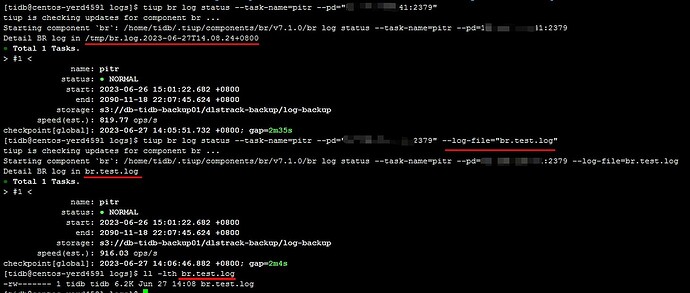Note:
This topic has been translated from a Chinese forum by GPT and might contain errors.
Original topic: br log 生成的日志文件如何存放在指定目录?
[Test Environment for TiDB] Testing
[TiDB Version] 6.5.2
After running the br log, the log file is by default placed in /tmp. The --log-file parameter can only specify the file to write to, and it seems there is no parameter to specify the directory, so that the generated log file like br.log.2023-06-27T13.06.59+0800 is placed in a specified directory. Could anyone please let me know if there is a way to specify the storage directory?
It is possible through external methods. I would like to know if BR has similar parameters to control this.
Or does BR have any related log cleaning strategies?
Refer to what I have done before, you can specify the location, I have placed it in the NFS share.
Enable log backup:
Add the shared directory /share/br-log/ to the KV node.
Execute
tiup br log start --task-name=pitr --pd "10.0.0.26:2379" --storage "local:///share/br-log"
I happened to test this log backup these past two days. I also specified the directory and encountered an error 
There are two parameters involved here, which can be confusing:
- -s, --storage: The path to store the TiDB log backup, change log. Here, a directory is specified.
- –log-file: The log generated by running br log. This can only specify a file name. This is just the log generated when you run the command, and it will not be continuously updated. So it does not need to be a directory.
For example, every time you check the status, a log will be generated. If not specified, it will be placed in /tmp by default.
This is the backup data, my data is stored in COS.
Yes, this situation is the same as mine. If not specified, it defaults to being placed under tmp. If specified, you can only specify a file, and this file can only get larger and larger without a cleanup strategy.
I am currently planning to use --log-file to specify the log file, and then use logrotate to manage the log files.
How did you operate it? Why is this log file getting bigger and bigger? I see that it stops updating once the command is executed.
“I understand, this can only specify the file name, and this is just the log generated when you run the command, it won’t keep updating.”
Got it, I wrote a script here, and each time I manage a task, I write the recorded log into the same file. I’ll just change the log strategy in the script.
Thanks a lot!
This topic was automatically closed 60 days after the last reply. New replies are no longer allowed.

